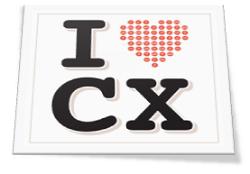 In a recent post, we discussed the need for brands – and radio stations – to develop that brief, but meaningful idea or value proposition in the minds of their consumers.
In a recent post, we discussed the need for brands – and radio stations – to develop that brief, but meaningful idea or value proposition in the minds of their consumers.
Today, we turn to the master of marketing for a little mentoring. We’re talking Steve Jobs, of course, and in a 7 minute video that is described on YouTube as an “oldie but goodie,” we get some helpful schooling. It’s a lesson in creating brand value that resonates today. Maybe you’ve seen it, maybe you haven’t, but it’s a great reminder of what companies need to do in a competitive media environment.
In the video, Jobs addresses the troops after returning to Apple in late ‘96/early ’97. Once you get past his shorts, you can’t help but notice the insights that he brought to the challenge of re-launching Apple’s damaged brand.
This is a lesson in marketing and branding that can serve as a reminder to those of us in radio who perhaps got too enamored with basic positioning, and lost sight of why consumers select the products they do.
 In the speech, Jobs reminds his minions that marketing Apple computers is not about pitching speed, RAM, or boot-up time. It’s about providing value to the consumer, and making her feel that Apple’s products deliver the kind of value that you can’t in any desktop or laptop.
In the speech, Jobs reminds his minions that marketing Apple computers is not about pitching speed, RAM, or boot-up time. It’s about providing value to the consumer, and making her feel that Apple’s products deliver the kind of value that you can’t in any desktop or laptop.
Jobs also speaks to the reality that should resonate with many in radio who read this post. He reminds us that “a great brand needs investment and caring if it’s going to retain its relevance and vitality.” Yet how many storied radio stations have suffered from neglect because weaker stations in the cluster demanded more attention?
He also touches on a concept that I rarely, if ever, hear discussed at radio research meetings and strategic sessions – core values. In public radio, this is in the DNA of individual stations, as well as the networks like NPR and PRI that feed them.
But commercial radio is typically more content to fall back on “The Country Station” or “Commercial Free Hours” rather than providing true value or meaningful values.
When radio was the only game in town – for talk, music discovery, local entertainment, and portability, this type of simple branding was crude but effective.
In today’s environment, it’s inadequate, and makes radio feel like it’s marketing its brand with Ries & Trout tactics in a Seth Godin world.
Steve Jobs figured that out 15 years ago. He concluded that if brands don’t create an emotional connection with their customers, all the “logic” in the world wouldn’t make the sale.
Show this video to your troops, your managers, your owners, and everyone else involved in your process.
What is your brand’s core value?
>EMAIL RECIPIENTS: CLICK HERE TO WATCH STEVE JOBS VIDEO<
Thanks to JacoBLOG reader Mike Anthony for bringing the video to my attention.
- A 2020 Lesson?It Could All Be Gone In A Flash - April 24, 2025
- How AI Can Give Radio Personalities More…PERSONALITY - April 23, 2025
- Can Radio Afford To Miss The Short Videos Boat? - April 22, 2025




When Steve Jobs retook the helm at Apple, their share of market was down, revenue and margins shrinking…kinda like radio. What if he had instituted company-wide layoffs in product development with fewer people creating more standardized versions of their existing lines? What if Apple’s products in 2012 were pretty much the same as they were in the late 90s, produced for much less money?
That’s pretty much the radio model – fire people until the numbers work.
Radio can’t replicate Apple because there is only one Steve Jobs, but a comparison could be eye opening. Try this simple test: Take a look at Apple’s top three products the year (1997) Steve Jobs returned – play with them, use them. Now do the same with their current product line. Then, do the same experiment with radio. Listen to a representative sample of radio in 1997 and compare it to a similar sample in 2012.
“…and that is all ye need to know”
Bob, Jobs understood the power of values and marketing, but also the importance of content – on in his case, Apple’s product line. Aside from his lessons about marketing with emotion in this video, his point about supporting the brand with investment should no t be lost on anyone in radio in the upper echelons. Radio cannot slash its way to prosperity and expect long-term results. Thanks, as always Bob, for pulling no punches.
I think the interesting wrinkle is that Jobs followed up on his marketing promise – inventing unheard of products and betting the farm on them. iPod, iPhone, iPad – if someone had described them in 1997 they would have been put on meds with regular levels monitoring. And those products in turn buoyed their Mac sales, not the converse.
Yup, and it all became symbiotic when the marketing thrust was in sync with products that excited and showed innovativeness. And yes, the Apple brand became the recipient of the all that brand equity.
We actually wrote out the core values for WYNY New York when launching it in 1978. The specific goal was the emotional link and the copy line in all external marketing was “The station that makes you feel good” and we demonstrated it. Note we had a marketing budget—2 Mil cash, 2 Mil barter. No station in NY has that size budget today so no one is serious.
Walter, thanks for both comments. Regarding YNY, you had a great run with that station and doing that “marketing homework” had to be part of the reason for that. While I agree that the lack of marketing dollars is part of the problem – and Jobs addresses company support in his speech – all of the TV ads in the world isn’t going to help the station saying “Today’s Soft Favorites.”